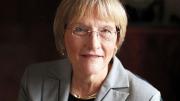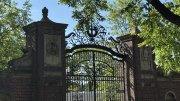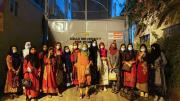In January, I gathered with hundreds of Harvard alumni and friends in London, and from there made the trip to Davos, Switzerland for the World Economic Forum. In both places, I was struck by how often conversations centered on the value of the humanities. Introducing a faculty discussion at Guildhall in London, alumnus Don Guiney described Harvard as having “handed him a looking glass,” an invaluable perspective that stretched beyond himself and yet at the same time cast his own life into new view. For the next hour, Harvard faculty members David Hempton, Jill Lepore, and Michael Norton explored the ways in which the ideal of a “successful life” has changed over the centuries. In Davos, an alumnus told me that, while at Harvard, he took a course called “Thinking About Thinking” that continues to influence all he does. I met later with Boris Johnson, the Mayor of London, who credits his reading of Classics at Oxford with shaping his views on everything from politics to public transportation. The common refrain was that such courses did more than transmit knowledge: they taught you how to imagine, adapt, assess, interpret, change, create.
Yet—at Harvard and elsewhere—students worry aloud about the repercussions of following their interest in art or linguistics or any of the other humanities disciplines. Given recent public discourse, their concern is understandable. It seems that every few weeks another column or report comments on bleak job prospects for recent graduates who did not major in something “useful.” Never mind that gaps in unemployment rates between degree holders are sometimes just one percent—as is the case with accounting and English language and literature—or that liberal arts majors close the salary gap over the course of their careers. Short-term snapshots translate into real anxiety for students and their parents, and it is imperative that we continue to make the case for education that encourages flexibility and invites change.
Why study the humanities? Interpretation, judgment, and discernment will always be in demand, and they are cultivated and refined in the humanities. We learn, for example, how civilizations have varied across space and time. We come to understand that the world has been different and could and will be different again. Literature and the arts enable us to see through a new lens, to look at the world through others’ eyes. Students in the humanities learn how to think critically and communicate their ideas clearly, and those transferrable skills lead to rewarding lives and careers in every field of endeavor.
If we hope that the next generation of leaders will build a world that is better than the one we inhabit, we must teach them the importance of stepping back from the urgent present to imagine a different future. The ability to innovate—a skill that nine of out ten employers agree is the most important for new hires—requires thinking beyond immediate needs and making creative leaps. Where better to model this approach than in the arts and humanities? They champion boldness in doing and thinking, leading to new and deeper understandings of the world. Training students narrowly for jobs that they can occupy immediately upon graduation is shortsighted: how many of those jobs will even exist a decade or two from now? Far better to create in students the capacities to confront the circumstances of life with a combination of realism and resilience and with habits of mind and skills of analysis that transcend the present.
In 1869, Harvard President Charles W. Eliot noted that “…to make a good engineer, chemist, or architect, the only sure way is to make first, or at least simultaneously, an observant, reflecting, and sensible man, whose mind is not only well stored, but well trained also to see, compare, reason, and decide.” While we now would of course add women to his prescription, we must continue to embrace his goal. We must challenge ourselves to ensure that our graduates are indeed prepared to “see, compare, reason, and decide.” The humanities are a critical part of that work. Understanding derives from both what is measurable and what is unmeasurable—it is enhanced by scientific insights and mathematical proofs, by philosophical puzzles, and by literature and art that transform the heart as well as the mind. Education must encompass all of these as it seeks to fashion not just employees and employers, but human beings who can help create a better future—for themselves and for the world.
Sincerely,
Drew Faust









